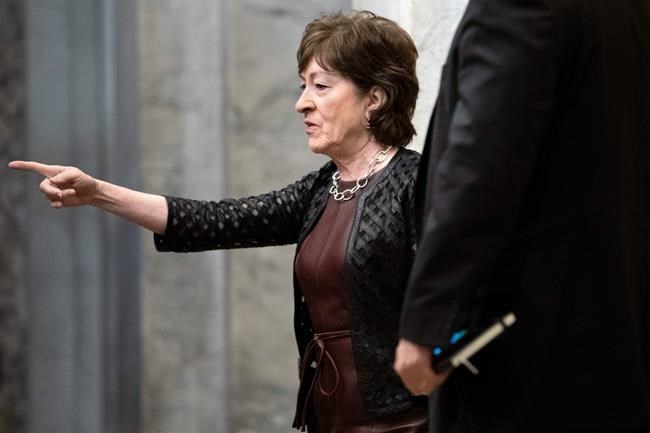
Sen. Susan Collins, R-Maine, points toward the elevator as she arrives, Wednesday, Jan. 29, 2020, on Capitol Hill in Washington, for the impeachment trial of President Donald Trump on charges of abuse of power and obstruction of Congress. (AP Photo/ Jacquelyn Martin)
Republished January 30, 2020 - 8:49 PM
Original Publication Date January 30, 2020 - 4:31 PM
WASHINGTON - Republican seatmates Susan Collins and Lisa Murkowski on Thursday passed a piece of paper back and forth, nodded — and then sent the note on an unusual journey across the Senate aisle, into the hands of Democratic Sen. Kyrsten Sinema.
Two hours later, Sinema posed the trial's first bipartisan question. On behalf of the power pocket of moderates, she asked: Will President Donald Trump assure the American public that private citizens won't conduct foreign policy unless the State Department requests it?
The query referred to the president's private lawyer, Rudy Giuliani, pressuring Ukraine to give Trump political help. But by asking it together — with Sen. Joe Manchin, a Democrat from West Virginia — the impeachment trial wildcards showed off their combined, potential influence over the deeply polarized Senate.
The trial's outcome is all but known: With a 53-seat Republican majority, the Senate is expected to acquit the impeached president of the abuse and obstruction charges against him. And the question of calling witnesses and Trump's acquittal could be answered quickly. GOP Sen. Lamar Alexander of Tennessee, who is retiring, said late Thursday that there was ‘no need’ for more evidence, boosting odds of Trump's swift acquittal.
Meanwhile, both sides were keeping close tabs on where the moderates stand.
Everyone was watching Collins, who faces a tough reelection race in Maine, and the frequently independent Murkowski of Alaska. Republican Sen. Susan Collins of Maine said late Thursday she would support a vote for witnesses, but that may fall short after Alexander's statement. Murkowski hadn't announced her decision.
The president would like nothing more than to claim a bipartisan acquittal, so Sinema and Manchin are being closely watched for any sign they might vote to clear him.
Sinema has said almost nothing publicly about whether she would vote for witnesses, let alone her final judgement. But she's drawn attention during the trial for huddling on the floor after adjournment with Republicans including Majority Whip John Thune of South Dakota and Lamar Alexander of Tennessee, who is retiring.
Manchin, meanwhile, ambled up to Collins during a break. She took his arm, they walked the rest of the way and talked at the top of the aisle. Later, he leaned into the Republican cloakroom, one hand on the door, and emerged with a can of Pringles potato chips, which he toted into the Democratic lounge.
The intense focus on the moderates meant the Senate was silent when Sinema rose and announced she had a question on behalf of four of them, and passed it to Chief Justice John Roberts.
“Will the president assure the American public that private citizens won't conduct foreign policy unless they have been specifically designated by State Department to do so?” Roberts asked.
The president's lawyers refused to make such a promise. Giuliani was only a “source of information” for Trump on Ukraine, said White House lawyer Patrick Philbin. Even George Washington, he said, relied on trusted confidants.
Lead prosecutor Adam Schiff later circled back. “They have now acknowledged that the person in charge of this was not conducting policy," he said.
Sinema's question was the first to come from senators of both parties, but not the last.
At another point, a page put a piece of paper with ragged edges such as those from a ripped notebook, on Murkowski's desk. She looked at it, then looked at it again.
Later, she posed a question on behalf of Sen. Brian Schatz, a Democrat from Hawaii, and herself:
Where is the line between between permissible political actions and impeachable political actions? Would they agree that all actions are inherently political?
Philbin replied: “The other party will always attribute bad motives.”
Schiff's answer: “Public officials are inherently political animals.”
Republicans were keeping close and visible tabs on the moderates. Every night after adjournment, Majority Leader Mitch McConnell's vote-counting team chats up Collins and Murkowski. And on Thursday during a late-afternoon break, Murkowski and McConnell sat in the most visible place, next to the centre aisle, and leaned in, chatting. McConnell mostly listened. Murkowski could be overheard saying something to him about listening to “both sides” and slowly shook her head.
For Trump, there is only one important side.
Speaking at a plant in Michigan on Thursday, he again cast himself as a victim. “We have great Republicans out there and they don't like it any better than you do,” he said of impeachment. "A very partisan situation.”
___
Associated Press writer Kevin Freking contributed to this report.
___
Follow Kellman on Twitter at: http://www.twitter.com/APLaurieKellman
News from © The Associated Press, 2020